
Nov 8, 2016 | Non categorizzato
 While undertaking their work regarding the migration phenomenon, and with active participation in the opinion debate in confrontation with ideological battles, a group of journalists and communication experts of various European regions (Italy, Hungary, Germany, Slovenia and Austria) are trying to open an original path towards narratives and interpretation and for journalists and also other professionals. Similar symposiums which gather media professionals have been held up to now in some troubled areas such as Budapest (Hungary), Athens (Greece), Man (Ivory Coast), and Warsaw (Poland). These meetings are promoted by NetOne (an international chain of professionals which works at the service of dialogue and peace among peoples). The aim is to establish a network of collaborators comprising of journalists and other media and communciation experts, NGO representatives, academics and social workers, to better understand the phenomenon in order to interpret it and to provide adequate narrative and communication tools. As of today, the experience has led to the growth of a mutual interest and way of listening (among journalists, between journalists and experts, and between journalist and migrants); the style used helps to understand the historical, cultural and political backgrounds underlying migrations. The professional symposiums were lately held in the migratory hot spots: Budapest (Hungary), Athens (Greece), Man (Ivory Coast), and Warsaw (Poland). The next on the agenda will be in Beirut (Lebanon) from 24 -27 November, Brussels (Belgium) from 26-28 January 2017, and in Chiaramonte Gulfi and Pozzallo (Italy) from 4-5 November 2016. The forthcoming session will be in Beirut-Ain Aar (Lebanon) from 24 – 27 November.
While undertaking their work regarding the migration phenomenon, and with active participation in the opinion debate in confrontation with ideological battles, a group of journalists and communication experts of various European regions (Italy, Hungary, Germany, Slovenia and Austria) are trying to open an original path towards narratives and interpretation and for journalists and also other professionals. Similar symposiums which gather media professionals have been held up to now in some troubled areas such as Budapest (Hungary), Athens (Greece), Man (Ivory Coast), and Warsaw (Poland). These meetings are promoted by NetOne (an international chain of professionals which works at the service of dialogue and peace among peoples). The aim is to establish a network of collaborators comprising of journalists and other media and communciation experts, NGO representatives, academics and social workers, to better understand the phenomenon in order to interpret it and to provide adequate narrative and communication tools. As of today, the experience has led to the growth of a mutual interest and way of listening (among journalists, between journalists and experts, and between journalist and migrants); the style used helps to understand the historical, cultural and political backgrounds underlying migrations. The professional symposiums were lately held in the migratory hot spots: Budapest (Hungary), Athens (Greece), Man (Ivory Coast), and Warsaw (Poland). The next on the agenda will be in Beirut (Lebanon) from 24 -27 November, Brussels (Belgium) from 26-28 January 2017, and in Chiaramonte Gulfi and Pozzallo (Italy) from 4-5 November 2016. The forthcoming session will be in Beirut-Ain Aar (Lebanon) from 24 – 27 November.
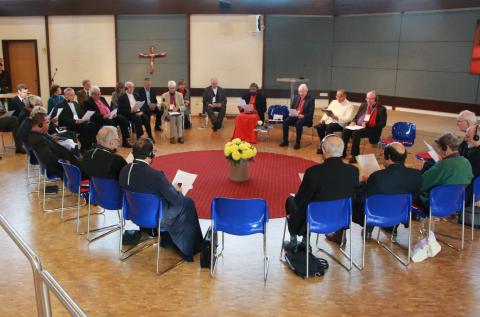
Nov 8, 2016 | Focolare Worldwide, Senza categoria

Photo credit: Ursel Haaf
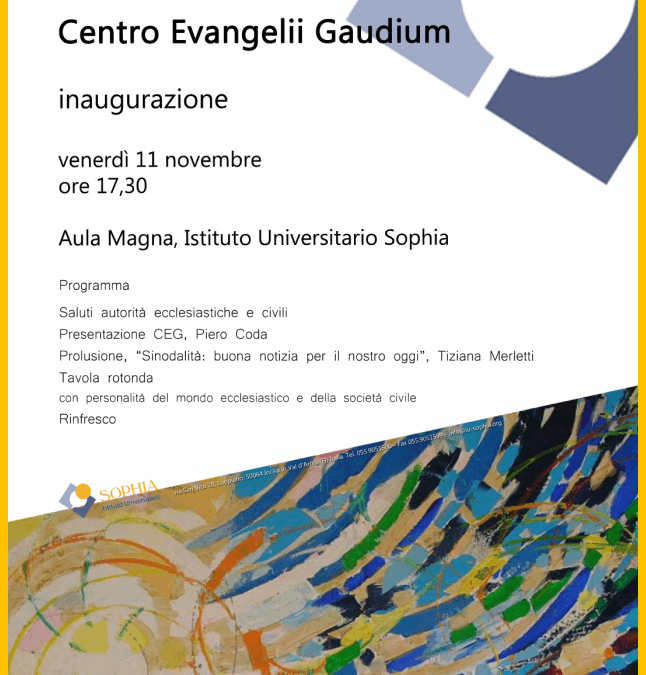
Nov 7, 2016 | Non categorizzato
 A new “laboratory” promoted by SUI in collaboration with the Focolare Movement Centres of Formation and Pastoral Action: Focolarini Presbyters & Deacons Centre, Volunteer Priests & Deacons Centre, the Gens Centre, Centre for Religious, Centre for Consecrated Persons, the Segretariat of the Parish Movement and the Secretariat of the Diocesan Movement. The Centre is intended to respond to Pope Francis’s invitation to the Church in Italy to take up his Joy of the Gospel Apostolic Exhortation to give content and direction to the work of pastoral renewal that is necessary for the evangelization that the Church is called to in order to “go out” to the existential peripheries of our time. The courses, seminars, workshops and stages that will be activated by the Centre will be directed towards priests, consecrated people, pastoral workers, lay people in ecclesial and social environments and, above, the young. They hope to contribute to this demanding and urgent task, engaging the spiritual impulses and experiences that have emerged from the charism of unity of Chiara Lubich. The mission of the Joy of the Gospel Centre (JGC) is to promote and support formation, research and study in the fields of Ecclesiology, Pastoral Theology and the Mission, Spiritual Theology and Theology of the Charisms and life of the Church today as it goes out on mission. The innauguration will begin with a from Cardinal Joao Braz de Aviz and Archbishop Vincenzo Zani. It will include a presentation of the Centre by the president of IUS, Piero Coda, and a keynote address on the main points of Pope Francis’s Apostolic Exhortation by Dr Tiziana Merletti, Superior General of the Franciscan Sisters of the Poor. Then there will be a roundtable with people from the world of culture, like Massimo Toschi and Damiano Tommasi. “The challenge is to manage to contribute something to that paradigm change in the culture and the relationships among ecclesial and civil communities,” said Piero Coda, “which out times ask for and which the prophecy of Pope Francis forcefully tells us that the moment has come to give a hand in fedelity and with creativity.” Press Conference presenting the Joy of the Gospel Centre of Higher Formation” (CEG): November 8, 2016; 11:30 at Toscana Oggi – Via dei Pucci 2, Florence. Moderator: Father Giovanni Momigli, CEG collaborator. Presentors include: Father Emilio Rocchi, Secretary of the Joy of Gospel Centre, Dr Sergio Rondinara (Epistomology and Cosmology Instructor at IUS) ****************************************************** Info: relazioni.esterne@iu-sophia.org – www.iu-sophia.org Sophia University Institute – Via San Vito 28, Loppiano – 50063 Figline e Incisa Valdarno (FI) ITA Tel. +39 055 9051500 – Fax +39 055 9051599
A new “laboratory” promoted by SUI in collaboration with the Focolare Movement Centres of Formation and Pastoral Action: Focolarini Presbyters & Deacons Centre, Volunteer Priests & Deacons Centre, the Gens Centre, Centre for Religious, Centre for Consecrated Persons, the Segretariat of the Parish Movement and the Secretariat of the Diocesan Movement. The Centre is intended to respond to Pope Francis’s invitation to the Church in Italy to take up his Joy of the Gospel Apostolic Exhortation to give content and direction to the work of pastoral renewal that is necessary for the evangelization that the Church is called to in order to “go out” to the existential peripheries of our time. The courses, seminars, workshops and stages that will be activated by the Centre will be directed towards priests, consecrated people, pastoral workers, lay people in ecclesial and social environments and, above, the young. They hope to contribute to this demanding and urgent task, engaging the spiritual impulses and experiences that have emerged from the charism of unity of Chiara Lubich. The mission of the Joy of the Gospel Centre (JGC) is to promote and support formation, research and study in the fields of Ecclesiology, Pastoral Theology and the Mission, Spiritual Theology and Theology of the Charisms and life of the Church today as it goes out on mission. The innauguration will begin with a from Cardinal Joao Braz de Aviz and Archbishop Vincenzo Zani. It will include a presentation of the Centre by the president of IUS, Piero Coda, and a keynote address on the main points of Pope Francis’s Apostolic Exhortation by Dr Tiziana Merletti, Superior General of the Franciscan Sisters of the Poor. Then there will be a roundtable with people from the world of culture, like Massimo Toschi and Damiano Tommasi. “The challenge is to manage to contribute something to that paradigm change in the culture and the relationships among ecclesial and civil communities,” said Piero Coda, “which out times ask for and which the prophecy of Pope Francis forcefully tells us that the moment has come to give a hand in fedelity and with creativity.” Press Conference presenting the Joy of the Gospel Centre of Higher Formation” (CEG): November 8, 2016; 11:30 at Toscana Oggi – Via dei Pucci 2, Florence. Moderator: Father Giovanni Momigli, CEG collaborator. Presentors include: Father Emilio Rocchi, Secretary of the Joy of Gospel Centre, Dr Sergio Rondinara (Epistomology and Cosmology Instructor at IUS) ****************************************************** Info: relazioni.esterne@iu-sophia.org – www.iu-sophia.org Sophia University Institute – Via San Vito 28, Loppiano – 50063 Figline e Incisa Valdarno (FI) ITA Tel. +39 055 9051500 – Fax +39 055 9051599
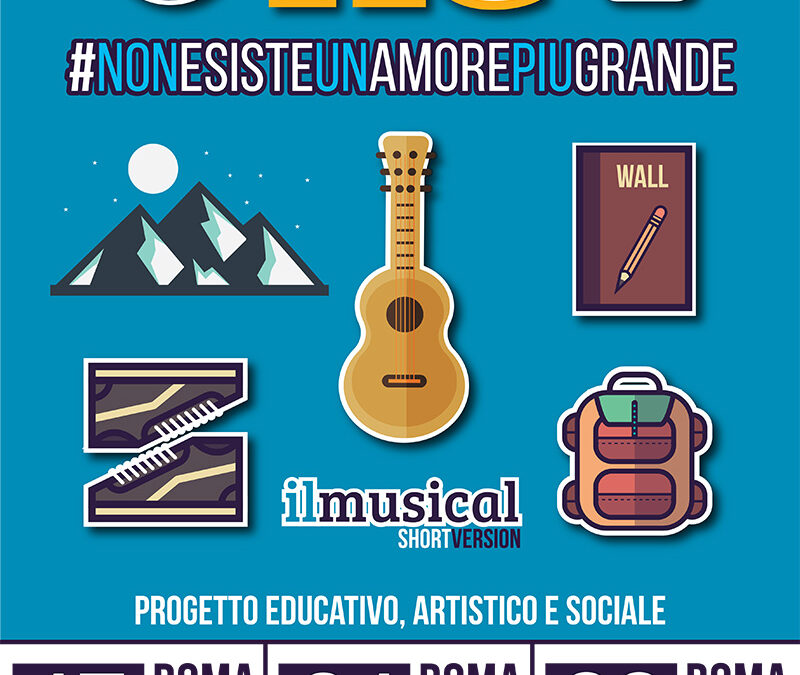
Nov 7, 2016 | Non categorizzato
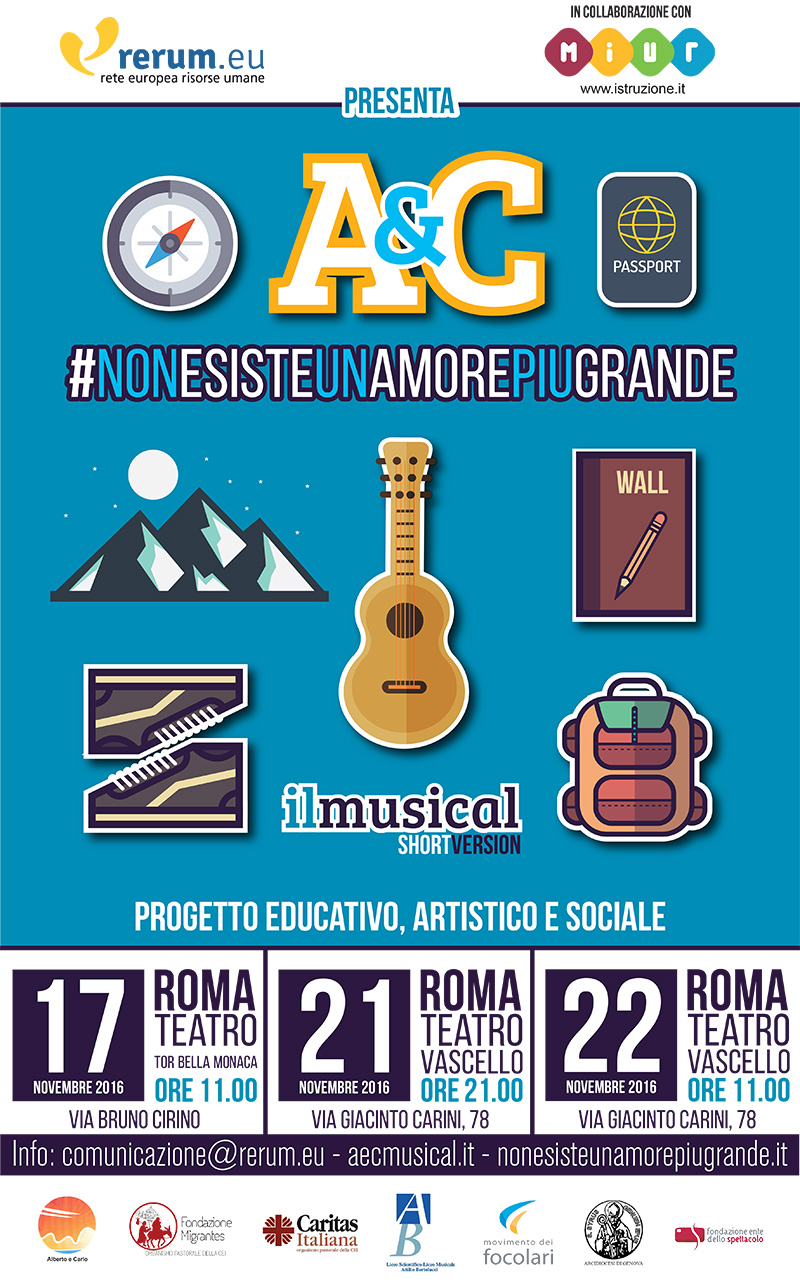 Finally, the staging of the musical production dedicated to the story of Alberto Michelotti, Carlo Grisolia (A&C) and their group of friends with their passions in life (sports, music, friendships), who would meet at the “Wall,” a small square at the outskirts of Genoa at the turn of the 1970s. It is the story of teenagers who committed themselves, against a backdrop of difficulties and sharing, the harbour, the place of confines, transitions, and encounters, especially among the youths, since those disembarking are mostly young people: kids who knew how to pay attention to the others, spending their time for this cause, and facilitating the encounter between the new and the diverse (which youths, unlike adults, do not fear). Friendship is the “philadelphia” which makes us discover the others deeply, perfectly, and as ontologically equal to us, and which substantiates and makes kinship, solidarity, peace, dialogue and openness a concrete reality. It is the decision to give one’s life for one’s friends that makes us really solid, open, respectful, and proactive. This is the “greatest love of all.” The show, in a first “short version,” will make its debut in November 2016 in two theatres in Rome, on the 17th at “Tor Bella Monaca,” and on 21 and 22 November at the “Vascello” theatre. In connection to this is an interesting and extensive educational and social project that will subsequently be proposed, in collaboration with M.I.U.R. Department for the Educational System and the General Management for the Student, Integration and Participation, the Secondary Institutes, thanks also to the support of the Migrantes Foundation, Italian Caritas, Alberto & Carlo Committee, Focolare Movement, Foundation of the Show Agency, the Bertolucci Parma High School and the Diocese of Genoa. A team of professionals (authors/composers, directors, scenic artists, musical directors, choreographers, light and sound technicians) are the real “coaches” of a young cast of artists coming from various Regions of Italian Secondary and University Institutes. Particularly important is the presence of a young Nigerian boy applying for political asylum, Above all these have been the first to be invited to relive and experience the values conveyed in the story of Alberto & Carlo. Source: rerum.eu
Finally, the staging of the musical production dedicated to the story of Alberto Michelotti, Carlo Grisolia (A&C) and their group of friends with their passions in life (sports, music, friendships), who would meet at the “Wall,” a small square at the outskirts of Genoa at the turn of the 1970s. It is the story of teenagers who committed themselves, against a backdrop of difficulties and sharing, the harbour, the place of confines, transitions, and encounters, especially among the youths, since those disembarking are mostly young people: kids who knew how to pay attention to the others, spending their time for this cause, and facilitating the encounter between the new and the diverse (which youths, unlike adults, do not fear). Friendship is the “philadelphia” which makes us discover the others deeply, perfectly, and as ontologically equal to us, and which substantiates and makes kinship, solidarity, peace, dialogue and openness a concrete reality. It is the decision to give one’s life for one’s friends that makes us really solid, open, respectful, and proactive. This is the “greatest love of all.” The show, in a first “short version,” will make its debut in November 2016 in two theatres in Rome, on the 17th at “Tor Bella Monaca,” and on 21 and 22 November at the “Vascello” theatre. In connection to this is an interesting and extensive educational and social project that will subsequently be proposed, in collaboration with M.I.U.R. Department for the Educational System and the General Management for the Student, Integration and Participation, the Secondary Institutes, thanks also to the support of the Migrantes Foundation, Italian Caritas, Alberto & Carlo Committee, Focolare Movement, Foundation of the Show Agency, the Bertolucci Parma High School and the Diocese of Genoa. A team of professionals (authors/composers, directors, scenic artists, musical directors, choreographers, light and sound technicians) are the real “coaches” of a young cast of artists coming from various Regions of Italian Secondary and University Institutes. Particularly important is the presence of a young Nigerian boy applying for political asylum, Above all these have been the first to be invited to relive and experience the values conveyed in the story of Alberto & Carlo. Source: rerum.eu
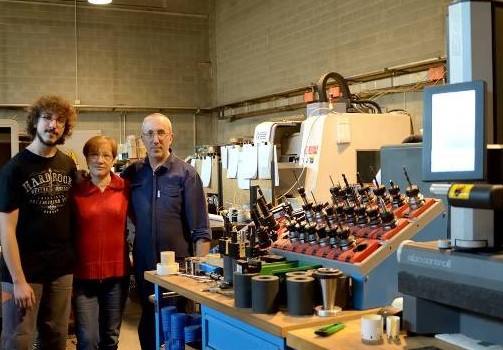
Nov 7, 2016 | Non categorizzato
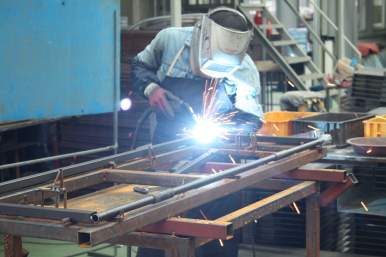 Some years ago, my husband and I took over a small mechanics company with six employees and many clients. It was a small dream come true also for the fact that we could in this way, ensure a business future for our children. Though the clients assured us that nothing would change, we came up against the harsh reality of a self-run business already in the first six months of work: discontinuity, bureaucracy and also some subtle attempts at corruption. It was important for us to do things legally and ignore these requests, but due to this attitude and the crisis of the automobile sector, in the span of a year we saw that the company’s turnover had been reduced to half. We thus found ourselves with lots of debts and without any resources, and as a consequence had to face the most difficult choice of firing most of the workers, giving them the time to find new jobs. We were also forced to sell the machinery to be able to give them their benefits. We took it all as a failure but didn’t give up. Around us the Focolare community of which we have been a part for some years, supported us with prayers and we entrusted ourselves to God to guide us in our decisions. Divine Providence did not tarry, and the occasion came up to change our business sector, which would give more warranties for continuity: my father gave us a sum with which to face the most urgent things; one of our sales agents leased a machine to us without charge; and the suppliers allowed us to make deferred payments. So we slowly recovered.
Some years ago, my husband and I took over a small mechanics company with six employees and many clients. It was a small dream come true also for the fact that we could in this way, ensure a business future for our children. Though the clients assured us that nothing would change, we came up against the harsh reality of a self-run business already in the first six months of work: discontinuity, bureaucracy and also some subtle attempts at corruption. It was important for us to do things legally and ignore these requests, but due to this attitude and the crisis of the automobile sector, in the span of a year we saw that the company’s turnover had been reduced to half. We thus found ourselves with lots of debts and without any resources, and as a consequence had to face the most difficult choice of firing most of the workers, giving them the time to find new jobs. We were also forced to sell the machinery to be able to give them their benefits. We took it all as a failure but didn’t give up. Around us the Focolare community of which we have been a part for some years, supported us with prayers and we entrusted ourselves to God to guide us in our decisions. Divine Providence did not tarry, and the occasion came up to change our business sector, which would give more warranties for continuity: my father gave us a sum with which to face the most urgent things; one of our sales agents leased a machine to us without charge; and the suppliers allowed us to make deferred payments. So we slowly recovered. 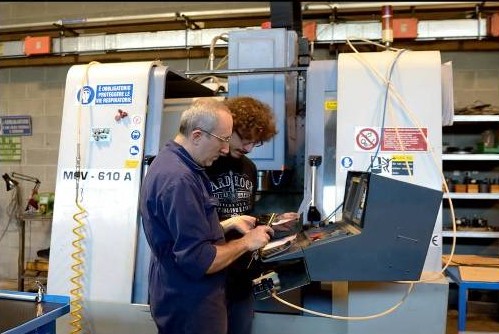 The most important result of that period was that our children had grown up with the concept of giving more value to the important things of a sober lifestyle, and experienced God’s love through many small but important signs. And this strengthened our family bonds. The year 2009 marked the start of the global economic crisis, and so we too felt the effects. At times we were overcome with discouragement but went ahead despite the immense difficulties that gave no certainty to the future. However, we confided in Providence which amazed us on many occasions, for example, that time when we were so worried because we hadn’t received even one order! I asked the volunteers of my group, with whom I share the Focolare spirituality to pray, and towards noon the fax machine started printing out 72 pages of orders! We really touched the power of prayer with our hands, and the concrete love of God for us.
The most important result of that period was that our children had grown up with the concept of giving more value to the important things of a sober lifestyle, and experienced God’s love through many small but important signs. And this strengthened our family bonds. The year 2009 marked the start of the global economic crisis, and so we too felt the effects. At times we were overcome with discouragement but went ahead despite the immense difficulties that gave no certainty to the future. However, we confided in Providence which amazed us on many occasions, for example, that time when we were so worried because we hadn’t received even one order! I asked the volunteers of my group, with whom I share the Focolare spirituality to pray, and towards noon the fax machine started printing out 72 pages of orders! We really touched the power of prayer with our hands, and the concrete love of God for us.  This summer, one of our clients who used to commission some occasional jobs, assigned an important job to us, that lasted a few months but which gave future prospects of huge orders and, therefore, the economic serenity we had always dreamed of. Towards the end of this job we discovered that the pieces produced would be used in the heavy artillery industry. We recalled the images of desperation of the many refugees escaping from wars in their countries. The decision to stop working for this company was a difficult one, since we could have ensured work for many months. But we had no doubts whatsoever. What made us happier is the fact that our son who had started working with us, fully agreed with our decision, and we are certain that God’s providence which we have experienced so many times over the past years, will not fail us.
This summer, one of our clients who used to commission some occasional jobs, assigned an important job to us, that lasted a few months but which gave future prospects of huge orders and, therefore, the economic serenity we had always dreamed of. Towards the end of this job we discovered that the pieces produced would be used in the heavy artillery industry. We recalled the images of desperation of the many refugees escaping from wars in their countries. The decision to stop working for this company was a difficult one, since we could have ensured work for many months. But we had no doubts whatsoever. What made us happier is the fact that our son who had started working with us, fully agreed with our decision, and we are certain that God’s providence which we have experienced so many times over the past years, will not fail us.

Nov 6, 2016 | Focolare Worldwide, Senza categoria
 The preamble to the Constitution of UNESCO declares: “Since wars begin in the minds of human beings, it is in the minds of human beings that defenses of peace must be built.” This November 15th, Chiara Lubich and the Focolare Movement’s efforts in favour of peace, will be remembered at the headquarters of UNESCO in Paris, France. We offer some thoughts of Igino Giordani about peace. He had first-hand experience of two world wars. “Social wounds are called wars and disagreements. They tear at the social fabric leaving wounds that are unable to be healed. Ancient souls yearned for peace: “if you want peace, prepare war,” said the Romans. But in the spirit of the Gospel, true peace is never obtained by war, but by the sprouting of a peaceful disposition and by a harmony of minds. You don’t commit evil to obtain good. “If you want peace, prepare peace.” Here again, you bring about renewal by building peace, not with weapons, but with love that revives life. When love is on the move it generates brotherhood, equality, unity. It vanquishes envy, arrogance and discord. It gathers people together into one family and one mind. Human life is sacred. Do not kill! Do not take revenge! Love your enemy! No retaliating. The portion of humanity that followed Christ understood the angelic message of the Gospel that was sung on the night of his birth: ‘Peace on Earth’. One lover of peace is all that is needed. Jesus opposed the generals and bloody heroes with peaceful ones, victorious over themselves, inspirers of peace within themselves, among citizens and foreigners…. He created a new and more difficult heroism: that of avoiding war in all of its forms, forever breaking the dialectic between pardon and remission. This peace is the fruit of love which requires us to love even our enemies, even those that bear false witness against us. It prevents fractures, or it heals them. In the regimes of love, discord is an absurdity, a negation, and those that provoke discord certainly place themselves outside the spirit of Christ: and outside they remain until harmony has been restored.” Source: Igino Giordani, Il messaggio sociale del cristianesimo, (Rome: Città Nuova, 1935 and 1966) p 360-368.
The preamble to the Constitution of UNESCO declares: “Since wars begin in the minds of human beings, it is in the minds of human beings that defenses of peace must be built.” This November 15th, Chiara Lubich and the Focolare Movement’s efforts in favour of peace, will be remembered at the headquarters of UNESCO in Paris, France. We offer some thoughts of Igino Giordani about peace. He had first-hand experience of two world wars. “Social wounds are called wars and disagreements. They tear at the social fabric leaving wounds that are unable to be healed. Ancient souls yearned for peace: “if you want peace, prepare war,” said the Romans. But in the spirit of the Gospel, true peace is never obtained by war, but by the sprouting of a peaceful disposition and by a harmony of minds. You don’t commit evil to obtain good. “If you want peace, prepare peace.” Here again, you bring about renewal by building peace, not with weapons, but with love that revives life. When love is on the move it generates brotherhood, equality, unity. It vanquishes envy, arrogance and discord. It gathers people together into one family and one mind. Human life is sacred. Do not kill! Do not take revenge! Love your enemy! No retaliating. The portion of humanity that followed Christ understood the angelic message of the Gospel that was sung on the night of his birth: ‘Peace on Earth’. One lover of peace is all that is needed. Jesus opposed the generals and bloody heroes with peaceful ones, victorious over themselves, inspirers of peace within themselves, among citizens and foreigners…. He created a new and more difficult heroism: that of avoiding war in all of its forms, forever breaking the dialectic between pardon and remission. This peace is the fruit of love which requires us to love even our enemies, even those that bear false witness against us. It prevents fractures, or it heals them. In the regimes of love, discord is an absurdity, a negation, and those that provoke discord certainly place themselves outside the spirit of Christ: and outside they remain until harmony has been restored.” Source: Igino Giordani, Il messaggio sociale del cristianesimo, (Rome: Città Nuova, 1935 and 1966) p 360-368.
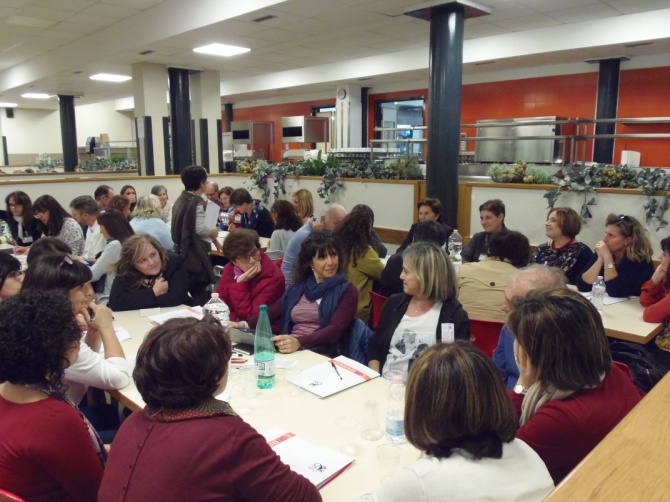
Nov 5, 2016 | Focolare Worldwide, Senza categoria
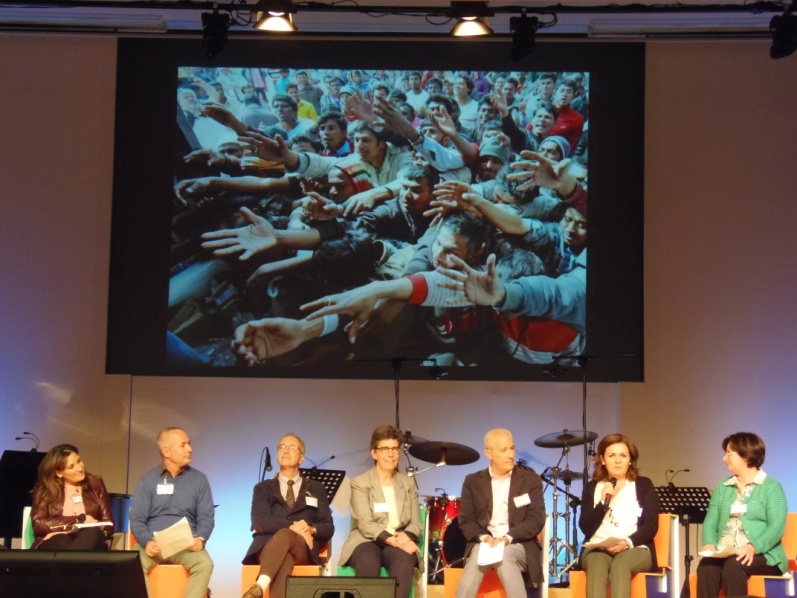 Hungary had been invaded by Soviet troops following the 1956 uprising. In response to the appeal of Pope Pius XII, Chiara Lubich wrote a letter that became the Magna Carta of a new calling in the Focolare Movement: the Volunteers of God, men and women who live the spirituality of unity and are especially committed to bringing the presence of God into society. Last October, a total of 1,840 participants from the wale of Italy, came together in Castel Gandolfo, Rome. “There’s a lot of desire to step up for our country, to overcome the fragmentation and to create a network of best practices that can provide mutual support. Now, it’s more necessary than ever before to give an intergenerational concrete response to the challenges of those that suffer in society.” This was the comment of one of the young participants that summarizes the three days of intense work. Focolare Movement president, Maria Voce, sent a message at the opening of the meeting in which she encouraged them to bear witness to the charism of unity in its more concrete expressions, keeping their gaze fixed on Jesus’s prayer “that all may be one” (Jn 17:21). The meeting continued with a series of reflections and testimonies on the central theme for the entire Movement this year: “Jesus Forsaken:
Hungary had been invaded by Soviet troops following the 1956 uprising. In response to the appeal of Pope Pius XII, Chiara Lubich wrote a letter that became the Magna Carta of a new calling in the Focolare Movement: the Volunteers of God, men and women who live the spirituality of unity and are especially committed to bringing the presence of God into society. Last October, a total of 1,840 participants from the wale of Italy, came together in Castel Gandolfo, Rome. “There’s a lot of desire to step up for our country, to overcome the fragmentation and to create a network of best practices that can provide mutual support. Now, it’s more necessary than ever before to give an intergenerational concrete response to the challenges of those that suffer in society.” This was the comment of one of the young participants that summarizes the three days of intense work. Focolare Movement president, Maria Voce, sent a message at the opening of the meeting in which she encouraged them to bear witness to the charism of unity in its more concrete expressions, keeping their gaze fixed on Jesus’s prayer “that all may be one” (Jn 17:21). The meeting continued with a series of reflections and testimonies on the central theme for the entire Movement this year: “Jesus Forsaken: 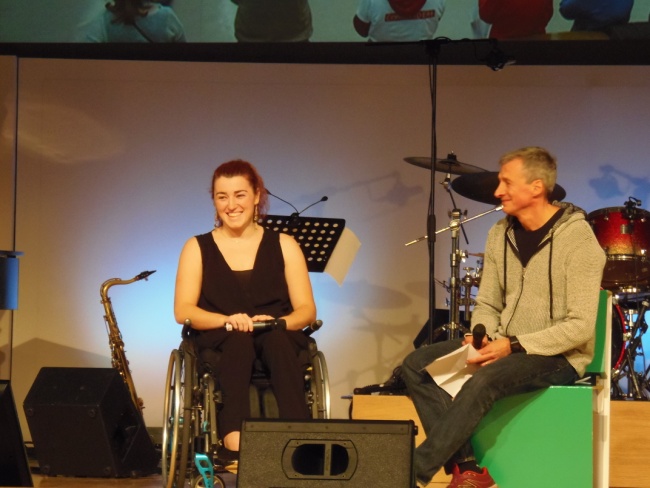 God’s aperture on the world, and the world’s aperture on God.” The testimonies were very moving. The voices of Pina and Tanina trembled as they told about their daily acts of heroism welcoming the thousands of refugees that have disembarked at the small island of Lampedusa in recent years: “We feel that these African brothers and sisters are our own until the time comes when we have to let them go. When they leave and disperse to many parts of the world we’re filled with emotions and concern for what still awaits them.” Journalist Riccardo Balaarm told how the painful experience of his disabled son led to a commitment among the National Paralympic Swimmers to promote the testimony of free swimmer and silver medallist Arjola Trimi from Rio, Brazil.
God’s aperture on the world, and the world’s aperture on God.” The testimonies were very moving. The voices of Pina and Tanina trembled as they told about their daily acts of heroism welcoming the thousands of refugees that have disembarked at the small island of Lampedusa in recent years: “We feel that these African brothers and sisters are our own until the time comes when we have to let them go. When they leave and disperse to many parts of the world we’re filled with emotions and concern for what still awaits them.” Journalist Riccardo Balaarm told how the painful experience of his disabled son led to a commitment among the National Paralympic Swimmers to promote the testimony of free swimmer and silver medallist Arjola Trimi from Rio, Brazil.  In the afternoons 150 groups discussed 35 topics: formation, social and political involvement; economy, health and ecology; art etc. These are all things that the Volunteers are called to deal with in their daily lives, through which they strive to fulfil their vocation as “first Christians of the twentieth century” as Chiara Lubich liked to call them: lay men and women that live the Gospel with the same fervour of the first Christians, committed to spending their lives for the building of a united world (Jn 17:21). A solemn moment was the signing of the act of initialization of the promotion of the Canonization Process for Volunteer Domenico Mangano from Viterbo, in the presence of Fr Andrea De Matteis, Vicar and Chancellor of the Diocese of Albano. https://youtu.be/EDCfdVUGa6s
In the afternoons 150 groups discussed 35 topics: formation, social and political involvement; economy, health and ecology; art etc. These are all things that the Volunteers are called to deal with in their daily lives, through which they strive to fulfil their vocation as “first Christians of the twentieth century” as Chiara Lubich liked to call them: lay men and women that live the Gospel with the same fervour of the first Christians, committed to spending their lives for the building of a united world (Jn 17:21). A solemn moment was the signing of the act of initialization of the promotion of the Canonization Process for Volunteer Domenico Mangano from Viterbo, in the presence of Fr Andrea De Matteis, Vicar and Chancellor of the Diocese of Albano. https://youtu.be/EDCfdVUGa6s
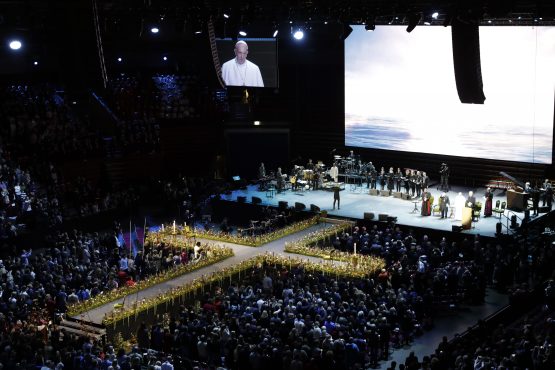
Nov 4, 2016 | Non categorizzato
 It might have been the presence of Pope Francis and of the highest representatives of the World Lutheran Federation. It might have been the moving words of the Joint Declaration being read in the Cathedral of Lund. Or it might have been the large turnout by the people. The fact is that the success of the 500th Anniversary of the Lutheran Reform went beyond every expectation. “Christ wants us to be one so that the world may believe,” Lutherans and Catholics proclaimed, convinced that “their way of relating with one another does have an effect on their witness to the Gospel.” The Declaration looks to the future and to daily life: moving beyond ourselves, our communities, our churches, to take action together “in service, in defence of human dignity and human rights, especially of the poor, working for justice and rejecting all forms of violence.” They agreed to work together “in welcoming the stranger and helping all those who have had to flee from war and persecution, to defend the rights of refugees and those seeking asylum.” They agreed to work together for the protection of Creation “that suffers from exploitation and the effects of insatiable greed.” The Declaration became global in its final appeal to Catholics and Lutherans of the whole world that “in every parish and Lutheran and Catholic community” they might be “courageous and creative,” completely forgetting conflicts of the past so that “the unity among us might guide our collaboration and deepen our solidarity.” The Lutheran Reform in Sweden was introduced for simply political reasons. King Gustav Vasa took control of the Church, and it was only in the year 2000 that the separation between Church and State took place. Over the course of the centuries Lutheranism acquired many characteristics that were then had a reflection on nations. But beyond the history of individual nations, today are witnessing the “Unity Reform” that is overwhelmingly desired by both the Catholic and Lutheran Church. This reform is also destined to become part of popular culture. It is founded on 5 commitments: 1) to begin from the perspective of our unity, not from the perspective of divisions; 2) to allow ourselves to be continually transformed by the encounter with the other; 3) to take concrete steps in seeking full visible unity; 4) to rediscover the power of the Gospel; 5) to offer a common witness to God’s mercy. Such commitments enable us to bear witness to the beauty of being Christians in diversity, because of the fact that what unites us is much more than what divides us. This has always been the guiding belief behind the long friendship between the Focolare and the Lutherans. Antje Jackelen, the first woman archbishop of the Lutheran Church of Sweden was interviewed by us regarding the contribution of the movements. She said that “they are ecumenical in their very design, so that with them any prejudices have already been beaten.” She also said that this week’s event “is also the result of 50 years of dialoguing and working together.” That afternoon at Malmö Arena in front of a crowd of 10.000 people, Pranita from India, Hector Fabio from Colombia, Marguerite from Burundi, Rose from South Sudan and Antoine from Syria shared their testimonies. They were able to demonstrate more than a thousand speeches the collaboration among the Churches through common efforts for the protection of Creation, social justice, children, the poor, farm workers and the victim of war. The Pope concluded: “These stories inspire us and give new motivation to our desire to be always more united. When we return home let’s take with us the commitment to do one act of peace and reconciliation each day, in order to be courageous and faithful witnesses of Christian hope.” JOINT STATEMENT on the occasion of the Joint Catholic-Lutheran Commemoration of the Reformation ( From Vatican radio)
It might have been the presence of Pope Francis and of the highest representatives of the World Lutheran Federation. It might have been the moving words of the Joint Declaration being read in the Cathedral of Lund. Or it might have been the large turnout by the people. The fact is that the success of the 500th Anniversary of the Lutheran Reform went beyond every expectation. “Christ wants us to be one so that the world may believe,” Lutherans and Catholics proclaimed, convinced that “their way of relating with one another does have an effect on their witness to the Gospel.” The Declaration looks to the future and to daily life: moving beyond ourselves, our communities, our churches, to take action together “in service, in defence of human dignity and human rights, especially of the poor, working for justice and rejecting all forms of violence.” They agreed to work together “in welcoming the stranger and helping all those who have had to flee from war and persecution, to defend the rights of refugees and those seeking asylum.” They agreed to work together for the protection of Creation “that suffers from exploitation and the effects of insatiable greed.” The Declaration became global in its final appeal to Catholics and Lutherans of the whole world that “in every parish and Lutheran and Catholic community” they might be “courageous and creative,” completely forgetting conflicts of the past so that “the unity among us might guide our collaboration and deepen our solidarity.” The Lutheran Reform in Sweden was introduced for simply political reasons. King Gustav Vasa took control of the Church, and it was only in the year 2000 that the separation between Church and State took place. Over the course of the centuries Lutheranism acquired many characteristics that were then had a reflection on nations. But beyond the history of individual nations, today are witnessing the “Unity Reform” that is overwhelmingly desired by both the Catholic and Lutheran Church. This reform is also destined to become part of popular culture. It is founded on 5 commitments: 1) to begin from the perspective of our unity, not from the perspective of divisions; 2) to allow ourselves to be continually transformed by the encounter with the other; 3) to take concrete steps in seeking full visible unity; 4) to rediscover the power of the Gospel; 5) to offer a common witness to God’s mercy. Such commitments enable us to bear witness to the beauty of being Christians in diversity, because of the fact that what unites us is much more than what divides us. This has always been the guiding belief behind the long friendship between the Focolare and the Lutherans. Antje Jackelen, the first woman archbishop of the Lutheran Church of Sweden was interviewed by us regarding the contribution of the movements. She said that “they are ecumenical in their very design, so that with them any prejudices have already been beaten.” She also said that this week’s event “is also the result of 50 years of dialoguing and working together.” That afternoon at Malmö Arena in front of a crowd of 10.000 people, Pranita from India, Hector Fabio from Colombia, Marguerite from Burundi, Rose from South Sudan and Antoine from Syria shared their testimonies. They were able to demonstrate more than a thousand speeches the collaboration among the Churches through common efforts for the protection of Creation, social justice, children, the poor, farm workers and the victim of war. The Pope concluded: “These stories inspire us and give new motivation to our desire to be always more united. When we return home let’s take with us the commitment to do one act of peace and reconciliation each day, in order to be courageous and faithful witnesses of Christian hope.” JOINT STATEMENT on the occasion of the Joint Catholic-Lutheran Commemoration of the Reformation ( From Vatican radio)
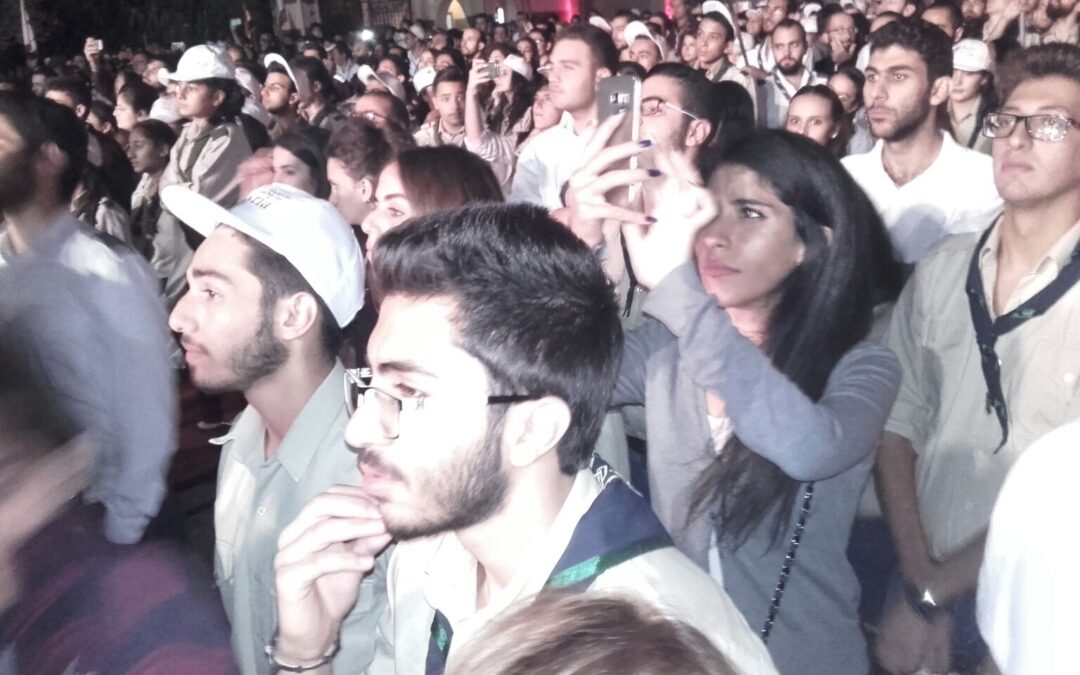
Nov 4, 2016 | Non categorizzato
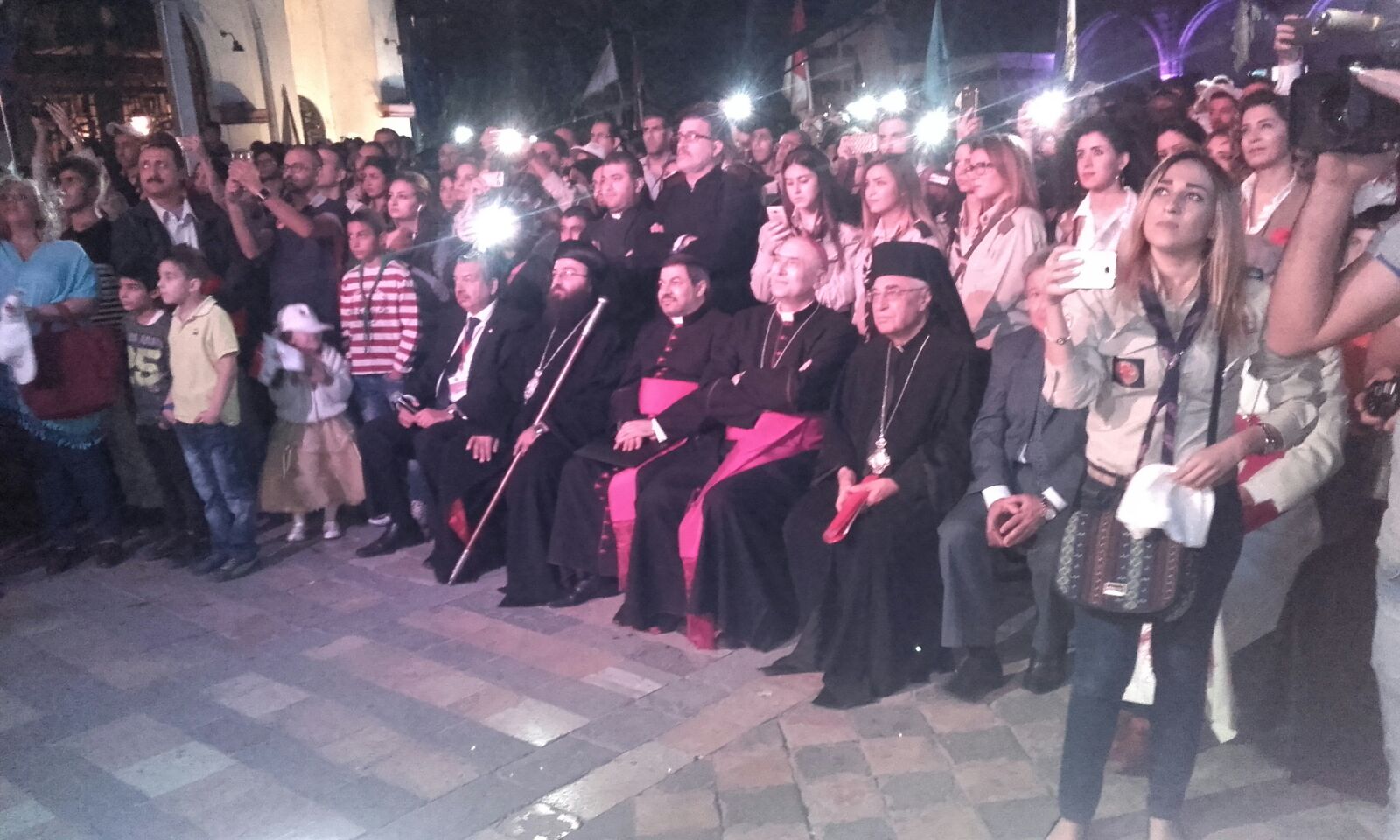 Greatly committed to assisting the civil population martyred by war that has dragged on for five years now, last 31 October, Caritas Internationalis called for a world day of prayer for Syria. Simultaneously, Pope Francis and other religious leaders prayed together for peace in the Middle East and particularly for the Syrian people, when they gathered in Sweden for the opening of the celebrations for the 500th anniversary of the Reform. «While the people are suffering, incredible sums of money are spent to supply the combatants, and some of these countries that furnish the arms are also those that advocate peace. How can we believe in those who caress with their right hand and strike you with the left??» This was Pope Francis’s admonishment in his impelling video message in support of the campaign promoted by Caritas Internationalis. After encouraging all to live the Year of Mercy with determination, the Holy Father forcefully underlined that “peace in Syria is possible,” and invited the church groups, parishes, and communities to promote all possible awareness campaigns «to spread a message of peace, unity and hope». And added: «After prayer, let works of peace ensue».
Greatly committed to assisting the civil population martyred by war that has dragged on for five years now, last 31 October, Caritas Internationalis called for a world day of prayer for Syria. Simultaneously, Pope Francis and other religious leaders prayed together for peace in the Middle East and particularly for the Syrian people, when they gathered in Sweden for the opening of the celebrations for the 500th anniversary of the Reform. «While the people are suffering, incredible sums of money are spent to supply the combatants, and some of these countries that furnish the arms are also those that advocate peace. How can we believe in those who caress with their right hand and strike you with the left??» This was Pope Francis’s admonishment in his impelling video message in support of the campaign promoted by Caritas Internationalis. After encouraging all to live the Year of Mercy with determination, the Holy Father forcefully underlined that “peace in Syria is possible,” and invited the church groups, parishes, and communities to promote all possible awareness campaigns «to spread a message of peace, unity and hope». And added: «After prayer, let works of peace ensue». 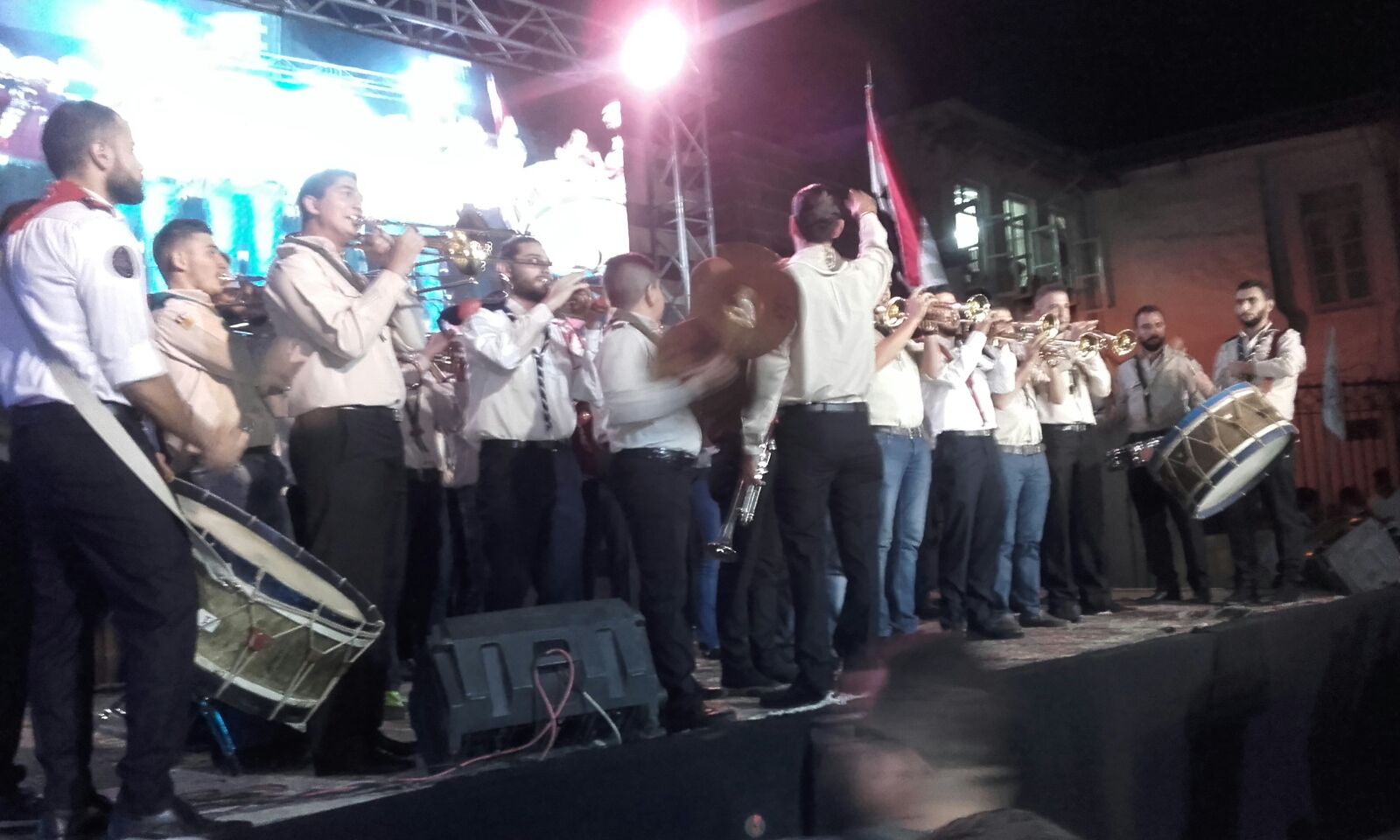 Many communities responded to the Pope’s appeal, especially the Christian community of Damascus, which gathered in prayer last Sunday, 30 October, believing in the force of prayer in asking for the gift of peace. Some members of the Focolare community who took part wrote: «We were there in the midst of a fully packed Church: the faithful of all the churches, Catholics, Orthodox and Evangelicals, the Apostolic Nuncio and some bishops. In those moments, more than ever, we felt the force of prayer, that unity is tangible, and there is strong hope that peace will soon be established. At the end of the prayer, the scouts coming from all over Syria presented some documentaries on peace in the square, and with songs, made us experience a moment of joy, with fireworks and launching of balloons.»
Many communities responded to the Pope’s appeal, especially the Christian community of Damascus, which gathered in prayer last Sunday, 30 October, believing in the force of prayer in asking for the gift of peace. Some members of the Focolare community who took part wrote: «We were there in the midst of a fully packed Church: the faithful of all the churches, Catholics, Orthodox and Evangelicals, the Apostolic Nuncio and some bishops. In those moments, more than ever, we felt the force of prayer, that unity is tangible, and there is strong hope that peace will soon be established. At the end of the prayer, the scouts coming from all over Syria presented some documentaries on peace in the square, and with songs, made us experience a moment of joy, with fireworks and launching of balloons.» 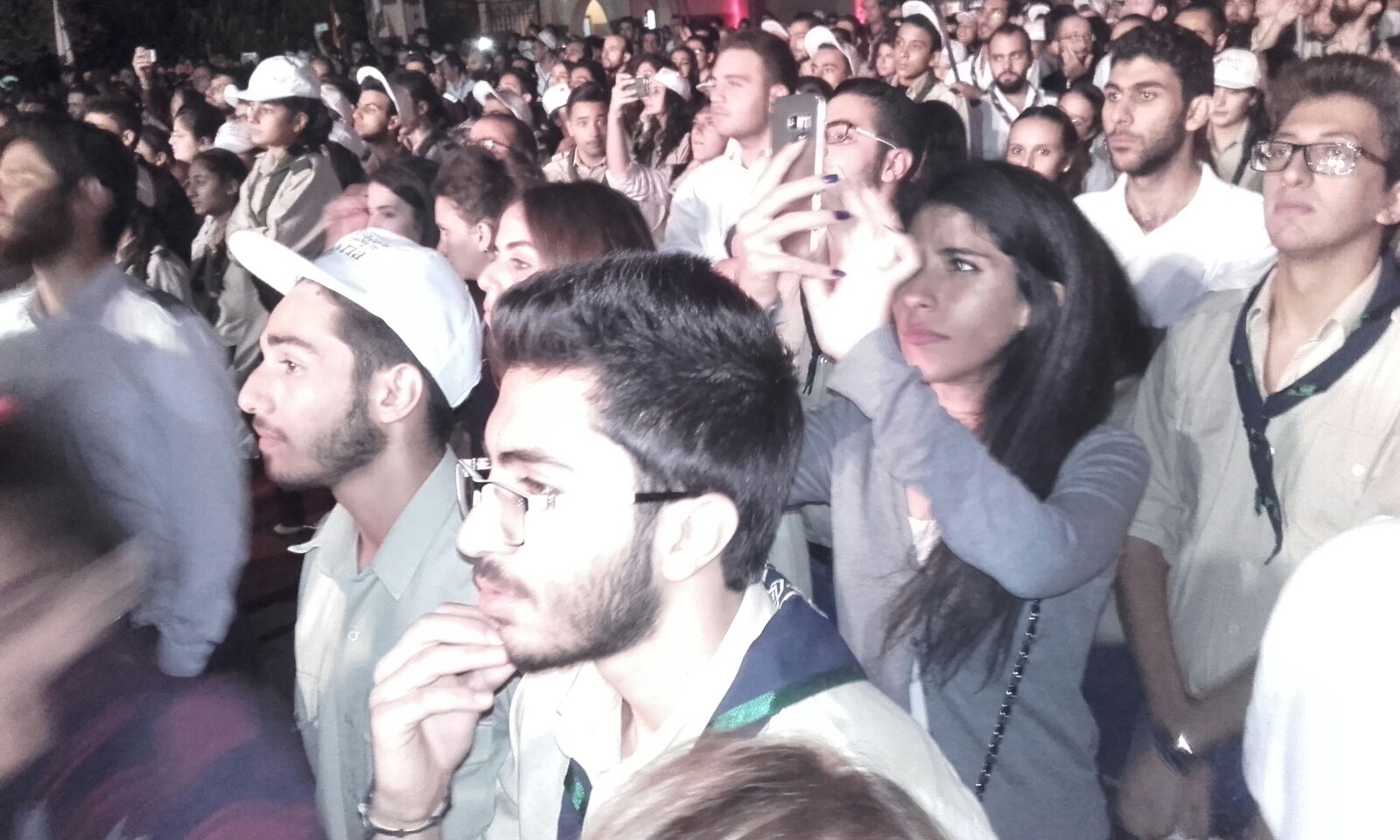 “Syria: peace is possible,” was thus Pope Francis’s invitation to all the faithful and people of good will; and an invitation to address «those who are involved in peace negotiations so that they take these agreements seriously and commit themselves to facilitating the humanitarian aid.» And he concluded: «Let’s join forces at all levels, to make peace in our beloved Syria possible.» Consult the Caritas Syria site (http://syria.caritas.org/)where all the materials to sign up and diffuse the peace campaign for Syria are available. #peacepossible4syria
“Syria: peace is possible,” was thus Pope Francis’s invitation to all the faithful and people of good will; and an invitation to address «those who are involved in peace negotiations so that they take these agreements seriously and commit themselves to facilitating the humanitarian aid.» And he concluded: «Let’s join forces at all levels, to make peace in our beloved Syria possible.» Consult the Caritas Syria site (http://syria.caritas.org/)where all the materials to sign up and diffuse the peace campaign for Syria are available. #peacepossible4syria
Nov 3, 2016 | Non categorizzato
Subsequent to the congress held on 27-29 January 2017, a second edition will be held at the International Mariapolis Centre in Castel Gandolfo (Rome) on 6-8 April 2017 from Thursday morning to Saturday lunch. Arrival can be on 4th April, or the evening 5th April (for those who have requested, there is the possibility to participate in the audience with Pope Francis on Wednesday 5th April). The theme of the Congress: “Jesus Forsaken: Window of God; Window for humanity”.

 While undertaking their work regarding the migration phenomenon, and with active participation in the opinion debate in confrontation with ideological battles, a group of journalists and communication experts of various European regions (Italy, Hungary, Germany, Slovenia and Austria) are trying to open an original path towards narratives and interpretation and for journalists and also other professionals. Similar symposiums which gather media professionals have been held up to now in some troubled areas such as Budapest (Hungary), Athens (Greece), Man (Ivory Coast), and Warsaw (Poland). These meetings are promoted by NetOne (an international chain of professionals which works at the service of dialogue and peace among peoples). The aim is to establish a network of collaborators comprising of journalists and other media and communciation experts, NGO representatives, academics and social workers, to better understand the phenomenon in order to interpret it and to provide adequate narrative and communication tools. As of today, the experience has led to the growth of a mutual interest and way of listening (among journalists, between journalists and experts, and between journalist and migrants); the style used helps to understand the historical, cultural and political backgrounds underlying migrations. The professional symposiums were lately held in the migratory hot spots: Budapest (Hungary), Athens (Greece), Man (Ivory Coast), and Warsaw (Poland). The next on the agenda will be in Beirut (Lebanon) from 24 -27 November, Brussels (Belgium) from 26-28 January 2017, and in Chiaramonte Gulfi and Pozzallo (Italy) from 4-5 November 2016. The forthcoming session will be in Beirut-Ain Aar (Lebanon) from 24 – 27 November.
While undertaking their work regarding the migration phenomenon, and with active participation in the opinion debate in confrontation with ideological battles, a group of journalists and communication experts of various European regions (Italy, Hungary, Germany, Slovenia and Austria) are trying to open an original path towards narratives and interpretation and for journalists and also other professionals. Similar symposiums which gather media professionals have been held up to now in some troubled areas such as Budapest (Hungary), Athens (Greece), Man (Ivory Coast), and Warsaw (Poland). These meetings are promoted by NetOne (an international chain of professionals which works at the service of dialogue and peace among peoples). The aim is to establish a network of collaborators comprising of journalists and other media and communciation experts, NGO representatives, academics and social workers, to better understand the phenomenon in order to interpret it and to provide adequate narrative and communication tools. As of today, the experience has led to the growth of a mutual interest and way of listening (among journalists, between journalists and experts, and between journalist and migrants); the style used helps to understand the historical, cultural and political backgrounds underlying migrations. The professional symposiums were lately held in the migratory hot spots: Budapest (Hungary), Athens (Greece), Man (Ivory Coast), and Warsaw (Poland). The next on the agenda will be in Beirut (Lebanon) from 24 -27 November, Brussels (Belgium) from 26-28 January 2017, and in Chiaramonte Gulfi and Pozzallo (Italy) from 4-5 November 2016. The forthcoming session will be in Beirut-Ain Aar (Lebanon) from 24 – 27 November.






 Some years ago, my husband and I took over a small mechanics company with six employees and many clients. It was a small dream come true also for the fact that we could in this way, ensure a business future for our children. Though the clients assured us that nothing would change, we came up against the harsh reality of a self-run business already in the first six months of work: discontinuity, bureaucracy and also some subtle attempts at corruption. It was important for us to do things legally and ignore these requests, but due to this attitude and the crisis of the automobile sector, in the span of a year we saw that the company’s turnover had been reduced to half. We thus found ourselves with lots of debts and without any resources, and as a consequence had to face the most difficult choice of firing most of the workers, giving them the time to find new jobs. We were also forced to sell the machinery to be able to give them their benefits. We took it all as a failure but didn’t give up. Around us the
Some years ago, my husband and I took over a small mechanics company with six employees and many clients. It was a small dream come true also for the fact that we could in this way, ensure a business future for our children. Though the clients assured us that nothing would change, we came up against the harsh reality of a self-run business already in the first six months of work: discontinuity, bureaucracy and also some subtle attempts at corruption. It was important for us to do things legally and ignore these requests, but due to this attitude and the crisis of the automobile sector, in the span of a year we saw that the company’s turnover had been reduced to half. We thus found ourselves with lots of debts and without any resources, and as a consequence had to face the most difficult choice of firing most of the workers, giving them the time to find new jobs. We were also forced to sell the machinery to be able to give them their benefits. We took it all as a failure but didn’t give up. Around us the  The most important result of that period was that our children had grown up with the concept of giving more value to the important things of a sober lifestyle, and experienced God’s love through many small but important signs. And this strengthened our family bonds. The year 2009 marked the start of the global economic crisis, and so we too felt the effects. At times we were overcome with discouragement but went ahead despite the immense difficulties that gave no certainty to the future. However, we confided in Providence which amazed us on many occasions, for example, that time when we were so worried because we hadn’t received even one order! I asked the
The most important result of that period was that our children had grown up with the concept of giving more value to the important things of a sober lifestyle, and experienced God’s love through many small but important signs. And this strengthened our family bonds. The year 2009 marked the start of the global economic crisis, and so we too felt the effects. At times we were overcome with discouragement but went ahead despite the immense difficulties that gave no certainty to the future. However, we confided in Providence which amazed us on many occasions, for example, that time when we were so worried because we hadn’t received even one order! I asked the 


 God’s aperture on the world, and the world’s aperture on God.” The testimonies were very moving. The voices of Pina and Tanina trembled as they told about their daily acts of heroism welcoming the thousands of refugees that have disembarked at the small island of Lampedusa in recent years: “We feel that these African brothers and sisters are our own until the time comes when we have to let them go. When they leave and disperse to many parts of the world we’re filled with emotions and concern for what still awaits them.” Journalist Riccardo Balaarm told how the painful experience of his disabled son led to a commitment among the National Paralympic Swimmers to promote the testimony of free swimmer and silver medallist Arjola Trimi from Rio, Brazil.
God’s aperture on the world, and the world’s aperture on God.” The testimonies were very moving. The voices of Pina and Tanina trembled as they told about their daily acts of heroism welcoming the thousands of refugees that have disembarked at the small island of Lampedusa in recent years: “We feel that these African brothers and sisters are our own until the time comes when we have to let them go. When they leave and disperse to many parts of the world we’re filled with emotions and concern for what still awaits them.” Journalist Riccardo Balaarm told how the painful experience of his disabled son led to a commitment among the National Paralympic Swimmers to promote the testimony of free swimmer and silver medallist Arjola Trimi from Rio, Brazil. 

 Greatly committed to assisting the civil population martyred by war that has dragged on for five years now, last 31 October, Caritas Internationalis called for a world day of prayer for Syria. Simultaneously, Pope Francis and other religious leaders prayed
Greatly committed to assisting the civil population martyred by war that has dragged on for five years now, last 31 October, Caritas Internationalis called for a world day of prayer for Syria. Simultaneously, Pope Francis and other religious leaders prayed  Many communities responded to the Pope’s appeal, especially the Christian community of Damascus, which gathered in prayer last Sunday, 30 October, believing in the force of prayer in asking for the gift of peace. Some members of the Focolare community who took part wrote: «We were there in the midst of a fully packed Church: the faithful of all the churches, Catholics, Orthodox and Evangelicals, the Apostolic Nuncio and some bishops. In those moments, more than ever, we felt the force of prayer, that unity is tangible, and there is strong hope that peace will soon be established. At the end of the prayer, the scouts coming from all over Syria presented some documentaries on peace in the square, and with songs, made us experience a moment of joy, with fireworks and launching of balloons.»
Many communities responded to the Pope’s appeal, especially the Christian community of Damascus, which gathered in prayer last Sunday, 30 October, believing in the force of prayer in asking for the gift of peace. Some members of the Focolare community who took part wrote: «We were there in the midst of a fully packed Church: the faithful of all the churches, Catholics, Orthodox and Evangelicals, the Apostolic Nuncio and some bishops. In those moments, more than ever, we felt the force of prayer, that unity is tangible, and there is strong hope that peace will soon be established. At the end of the prayer, the scouts coming from all over Syria presented some documentaries on peace in the square, and with songs, made us experience a moment of joy, with fireworks and launching of balloons.»  “Syria: peace is possible,” was thus Pope Francis’s invitation to all the faithful and people of good will; and an invitation to address «those who are involved in peace negotiations so that they take these agreements seriously and commit themselves to facilitating the humanitarian aid.» And he concluded: «Let’s join forces at all levels, to make peace in our beloved Syria possible.» Consult the Caritas Syria site (
“Syria: peace is possible,” was thus Pope Francis’s invitation to all the faithful and people of good will; and an invitation to address «those who are involved in peace negotiations so that they take these agreements seriously and commit themselves to facilitating the humanitarian aid.» And he concluded: «Let’s join forces at all levels, to make peace in our beloved Syria possible.» Consult the Caritas Syria site (